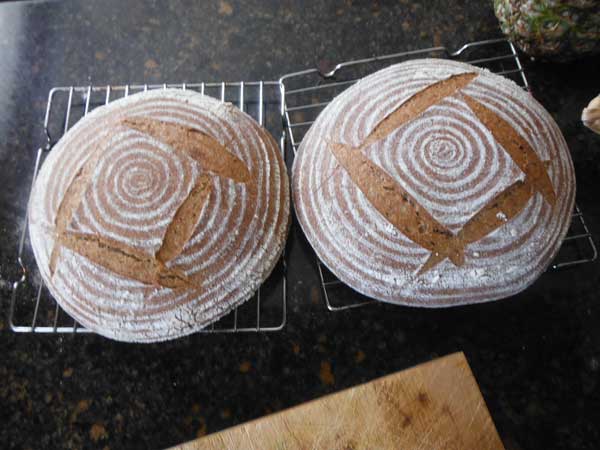Whole Wheat, Kamut, Semolina Sourdough Loaf
Is this the last bread I'll ever make? I never know these days, as I am beginning to put into place my intention to perform a juicing detox, and totally fast from bread for a few days (10, 21, 30 or 60 -- perhaps forever, who knows?). Meanwhile, I'm still making these whole grain breads, and eating them on the days when I eat anything at all.
This bread was an attempt to repeat the unusual technique of steeping the dough while bulk fermenting, as I did when I mixed a bread with ginger tea. This time I did not use tea but water alone; and it was not a high temperature, but right out of the tap.
Ingredients
- 700g Whole wheat berries, freshly milled
- 200g Kamut flour
- 100g Semolina flour
- 200g Sourdough starter
- 20g Sea Salt
- 720g Original water
- 50g water added with salt after a short autolyse
- 50g water added to steep the dough
(Total water 820g, total hydration 82%)
Method
This method was designed around the fact that I had to sleep during the day, and work at night. I generally go to bed around 1100 on the first day of a series of night shifts, and try to sleep till mid afternoon, whether I'm tired or not. It's not a healthy lifestyle, working at night, but someone has to do it, and we nurses each take our turn.
In the morning, after a usual night of sleep, I mixed up the flour and 720g of the water, kneading it for about 5 minutes. This dough gets to autolyse, or sit there without salt, for about an hour. The salt is added with 50g more water, and this is folded in, in the bowl, until all the water is incorporated. At this point, the dough is kneaded again for about 5-10 minutes, until it is smooth and fairly tight. I let it sit in the bowl another 30 minutes, then I kneaded it again.
At this point, when I returned it to the bowl, I poured 50g of water over top of it, and just let it sit. At the 30 minute mark, I did a stretch and fold a few times, until much of the water was incorporated. There was still a dribble in the bottom of the bowl that I wasn't going to worry too much about. I let it sit another 30 minutes, then poured the dough out on the counter, divided it, and preshaped it. After a short 30min bench rest, I finished shaping the dough, and put it in proofing baskets. Then I went to bed.
I got up around 3pm, and turned the oven on to preheat the stones. The dough had therefore only been proofing about 4 to 4 1/2 hours before hitting the oven. This dough seems quite sloppy, and it deflated a bit upon moving from the basket to the peel, being scored, and then transferred to the hot stone. But over the 40 minute baking period, it did rise enough to fill in the score marks, so I was happy with the results. The temperature was the usual Tartine bread amount of 450 degrees F, and it sat there for 40 minutes, with steam in the oven during the initial period.
Results
I enjoyed this bread, as did my wife. It was quite moist. Without the technique of steeping the dough during stretches and folds, this bread dough would have been extremely difficult to handle. This is a gentle way to get the hydration level up.
Raw Apes
As I continue to think about a detox from bread (without having done it yet), my interest in juicing has caused me to turn my attention to the raw foodists, to consider their ideas and diet plans. Everyone has different ideas, of course, about what makes up the best raw food diet for humans. I stumbled around looking for who I ought to trust in these matters, until I encountered the work of Frederic Patenaude.
After reading only some of his extensive material (e.g. Patenaude, F. (2006) Raw secrets: the raw food diet in the real world. FrederickPatenaude.Com, Montreal), I hope I'm not doing it a disservice by giving a nutshell synopsis here. Interested persons can check out his web presence. He has a lot of YouTube videos, for instance -- this one, "High Fruit or High Fat?" is linked-to from his web page)
Patenaude considers humans to be most similar to the Bonobos in their raw diet requirements, based on our genetics and physiology/biology. That means he says we evolved eating a mostly frugivore diet. In other words, our raw diet ought to consist mainly of fruits, and greens, and vegetables, perhaps a few nuts, almost no seeds or beans, and certainly no grains, dairy or meat. He does indicate that some vegetables (and he even concedes a bit of rice) can be more easily digested when lightly steamed; and thus he doesn't insist on a totally raw or even totally organic diet. He suggests ways to increase the amount of raw fruits and vegetables and greens in the diet, until one is eating 70, 80, 90 percent or more of one's food from these raw groups alone, always with the understanding that 100% is possible for everyone. What this means is buying fruit by the caseload, and looking for ways (sprouting your own greens, growing your own veggies, joining or creating co-ops, using community supported agriculture, buying groups, etc.) to make it affordable.
I'm not sure if I have the stomach for it, but someday I'd like to take Pautenade's challenge and see if I can do it for 6 months, following a detox. But let's see if I can ease my way into it a bit, though, with juicing, and a detox from bread for a shorter period.
Meanwhile, I continue to make my bread the healthiest way I know how, and eat it along with fruits and vegetables, and cheese, and even some cooked vegetarian food. But I've introduced juices to my diet -- mostly fresh wheatgrass juice and green juice, that my coworkers tease me about because it looks like bile.
Notes to Myself
- Having become a vegetarian more than a couple of decades ago, I know very well the impact a change in diet has on one's social life. I imagine that further restrictions in diet (like eating exclusively raw food) would have an even more drastic effect. I struggle with this: removing cooked foods from one's diet actually challenges our civilized behaviour -- i.e. it challenges my ability to live with civilized people without unintentionally pissing them off.
- I still like bread. As I prepare for a detox from it, I begin to wonder how I will fare. Can I possibly eat enough fruit and veggies raw to make up for the bread in my diet these days? How will I feel when I remove the dairy fats from my diet?












No comments:
Post a Comment